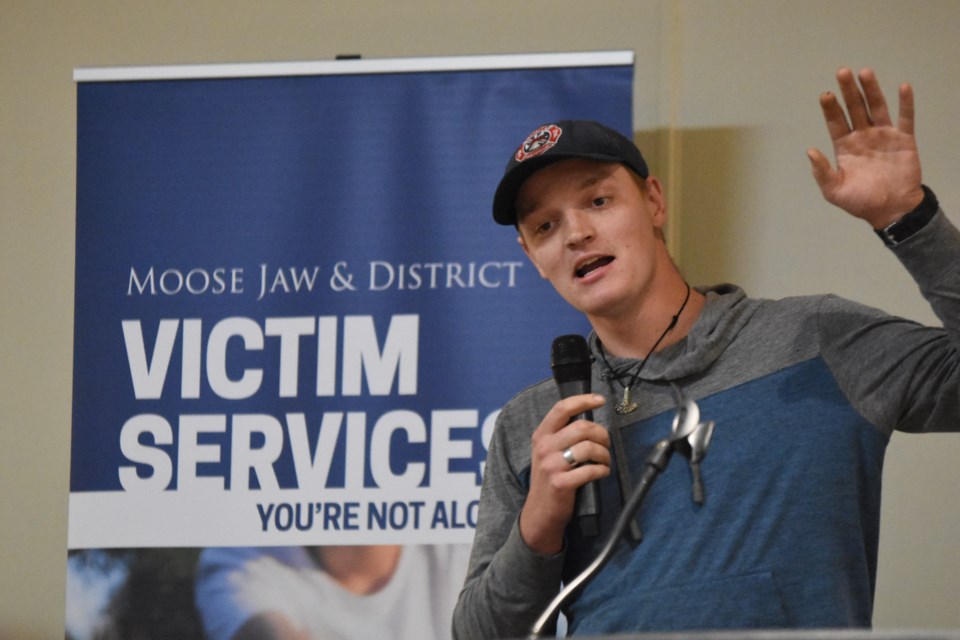Predators who victimize children and youths should have all their rights taken away and should never be given second chances, says an advocate for victims and survivors.
Whitewood native Zachary Miller was a guest speaker at a luncheon held at the Heritage Inn on May 29 to acknowledge Victims and Survivors of Crime Week. The goal of the week is to raise awareness about the issues facing victims and survivors of crime and about the services, assistance and laws in place to help them and their families.
The theme of the week was “The Power of Collaboration.”
Miller, now 23, was 10 years old when convicted pedophile Peter Whitmore kidnapped him and another boy on July 29, 2006 from Whitewood and drove them to Kipling. There, Whitmore repeatedly sexually assaulted them during a two-day period, before police rescued the boys and arrested Whitmore.
It was learned recently that Whitmore has an online profile on a penpal website for inmates.
While speaking during the luncheon, Miller paced back and forth on the stage, his thoughts unbridled and his words flowing freely. He called the abuse of kids a “bloody epidemic.”
“There is a loophole in the system,” said Miller, who sleeps three hours a night and has post-traumatic stress disorder (PTSD). Whitmore is supposed to be serving a life sentence in jail, yet he has been in jail eight times previously for similar offences.
“What do we do? If (predators) victimize someone, there is no coming back. They can’t change. Once a predator, always a predator,” continued Miller. “We have to take away those rights” to communicate with the outside world.
Court documents filed as part of Whitmore's past cases show how prison psychologists have characterized him as a manipulative liar, unwilling to admit he had ever harmed anyone.
Miller told the crowd he is glad this situation happened to him since he won’t quit speaking out about this issue.
“It’s time to take the rights of the victims back,” he stated.
Miller has worked with the Canadian Centre for Child Protection (CCCP) for four years as a spokesman on victimization and child abuse. He pointed out the statistics around child kidnappings are alarming.
About 75 per cent of kids abducted never come home. Of the 25 per cent that do, they are dead within 10 years due to suicide or overdoses. Five per cent of abductees survive, but become like the people who abducted them.
“I can now read people and understand what they have gone through,” he said. “Now I am on the side of the RCMP (and police) and what they go through (mentally). It’s time to start doing something about this. Any kid who is victimized needs help.”
Miller’s kidnapping and sexual assault broke his family. He was forced back into school two weeks after he was found and was immediately bullied. Even his teachers made fun of him and treated him differently.
It didn’t help that most people in Whitewood turned on the Millers, either.
“We were annexed as a family,” he said.
When Miller was 14, he was helping his mother sell produce at a farmers’ market. A woman came up to their table, recognized him, and said to his mom, “So you’re the mother of the boy who caused all the trouble in Whitewood.”
A publication ban was in place since 2006 preventing Miller’s name from being published. After he got it lifted in 2015, he was accused in a coffee shop of being an attention grabber.
Since 2015, Miller has worked in schools and communicated with students about safety. He can come down to their level and explain what he’s gone through. He also works with children who have been rescued from abuse.
Miller wants to start an animal therapy program on his farm so he can help other youths affected by abuse. He noted that working with animals instills confidence in kids since the animal relies on its handler.
“It’s time to do something,” he added. “Not just with victimized kids, but at-risk teens … (and) suicidal kids. … We have to deal with it.”




